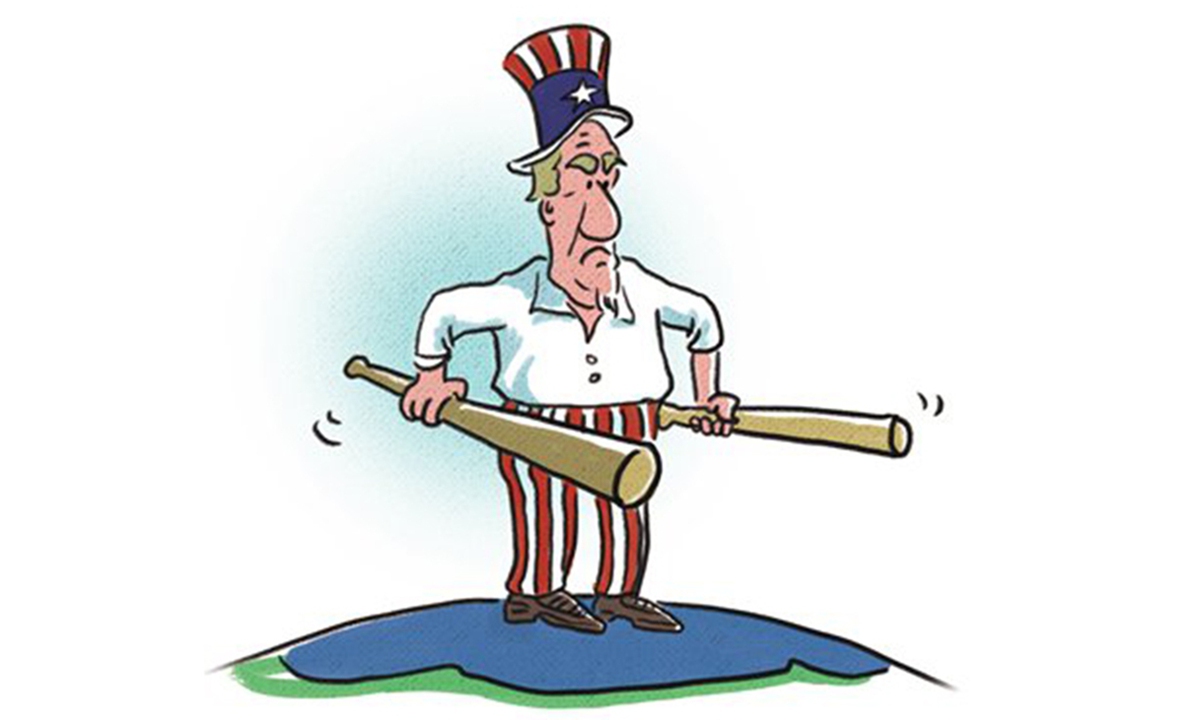US ‘coercive diplomacy’ is getting less effective

US hegemony Illustration: Liu Rui/GT
These days, the US tends to kidnap countries across the international community that are not standing with it over the Ukraine issue. Washington's senior officials have taken turns, making intensive threats to countries, including China and India. On Wednesday, US Deputy Secretary of State, Wendy Sherman, arrogantly said that sanctions on Russia should give China a "good understanding" of the consequences it could face if it provides material support to Moscow. On the same day, the director of the White House National Economic Council, Brian Deese, claimed that the US told India that the consequences of a "more explicit strategic alignment" with Moscow would be "significant and long-term." Previously, US officials named and pressured India in several occasions and even hinted at imposing sanctions. US President Joe Biden also criticized India's response to the Russia-Ukraine conflict as "shaky."
It seems that the Ukraine crisis is also a mirror reflecting the US' nature of seeking hegemony for itself by coercion. Washington first kidnapped small countries with the lure of security, turning them into pawns to check and contain major countries. Then, it has continued to instigate and incite disputes, and pushed these pawns into the fiery pit, held allies hostage by virtue of so-called values and made them pay for its hegemony. After that, Washington has further expanded its scope and exploited various means to force other countries across the world to take sides, trying to overwhelm opponents and maintain its absolute hegemony.
Ironically, Washington has been accusing China of engaging in "coercion diplomacy" in recent years but the Ukraine crisis has precisely shown that it is the US who is sparing no efforts to coerce other countries. It is trying to drag other parties to the crisis while it passes the bucks and reaps profits.
As a matter of fact, "coercive diplomacy" is tailor-made for Washington. The term "coercive diplomacy" was also created by US scholars to summarize US policies toward Laos, Cuba and Vietnam in the 1970s. After the end of the Cold War, from Latin America to Europe and the Asia-Pacific, through rogue-style measures such as military threat, political isolation, sanctions and blockades on technology, the US has intimidated small countries to serve its national interests. Otherwise, those countries would be sanctioned and isolated, and their governments could be overthrown. "Coercive diplomacy" has been integrated into the path of American foreign behavior and it has risen and fallen together with US hegemony. The US has formed a system of "combination blows" to fully coordinate with its hegemonic logic that "whoever obeys the US will be prosperous but who goes against it will suffer."
On one hand, "coercive diplomacy" has a strong implication of hijacking morality and intimidation. The US has gone out of its way to monopolize the interpretation of "democracy," "freedom," "human rights" and "sovereignty." It tends to stick various labels to non-Western countries that insist on independent foreign policy and push them into the opposite of "universal values." The values and aspirations accumulated over the long history of human kind have become the sandglass that the US can wantonly overturn. At one time it wants "human rights to override sovereignty" and at another moment it advocates that "sovereignty should override human rights."
On the other hand, "coercive diplomacy" is all about calculation of interests. Recently, the Deputy Secretary of the Security Council of Russia, Mikhail Popov, said that the US, while pressuring European countries to sanction Russia, itself continues to import Russian oil with last week's imports increasing 43 percent from a week ago, to 100,000 barrels per day. It also allowed US firms to import Russian mineral fertilizers. For Europe, war and sanctions brought wave of refugees, capital outflow and energy shortages, but for the US, war and sanctions have allowed the US to profit from the chaos.
However, US' "coercive diplomacy" has also eroded American national credibility as it has caused a large number of victims. Data showed that since the World War II, the number of unnatural deaths of foreign citizens due to US sanctions have exceeded the total death toll in all the wars during the same period. Now, more and more countries are unwilling to submit to US coercion. Therefore, in face of the US pressure, Indian Prime Minister Narendra Modi said that "India stands firm before the world with its interests without any fear or pressure." Countries like Singapore, which has "friendly ties" with the US, also expressed that they are reluctant to take sides. These are the resistance against US "coercive diplomacy."
US "coercive diplomacy" is increasingly ineffective as its fake morality and true hegemony are seen by the world. Fundamentally, it is Washington that stands on the wrong side of history. It cannot always threaten other countries to "take chestnuts from the fire" for it, and it is even less possible to extend its hegemony through intimidation.
Photos
Related Stories
- (Poster) How the U.S. war machine rakes in money
- Outbreak of bird flu causes price of eggs to soar in U.S.
- U.S., Britain, Australia to develop hypersonic missiles
- Blinken's Mideast tour unlikely to contribute to regional peace: analysts
- How is the US making a fortune out of the Russia-Ukraine military conflict?
Copyright © 2022 People's Daily Online. All Rights Reserved.










